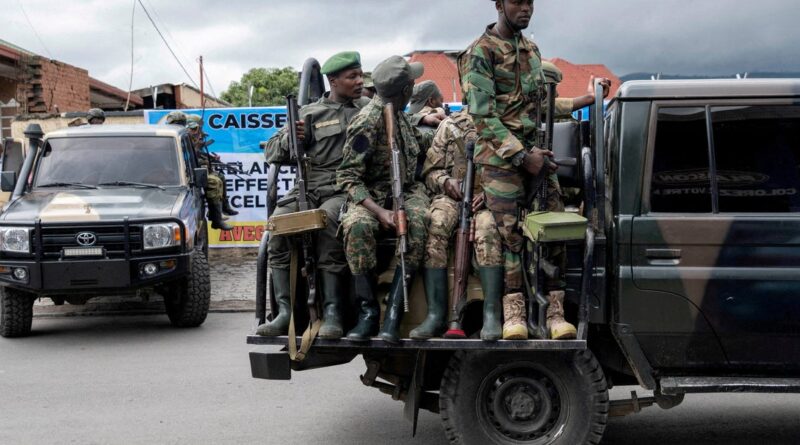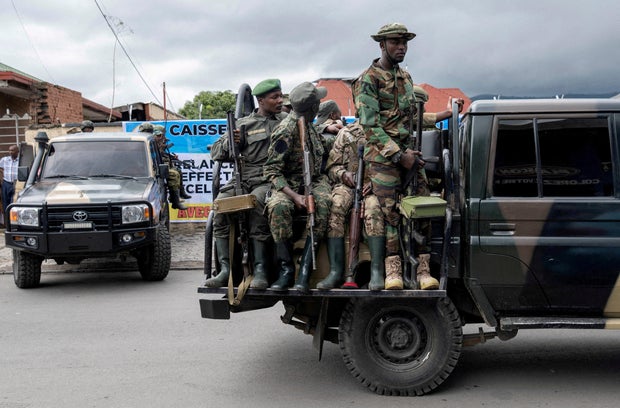U.S. brokers deal between Democratic Republic of Congo and Rwanda to end war over mineral wealth
Johannesburg, South Africa — At the invitation of Democratic Republic of Congo President Felix Tshekedi, the Trump administration was brought in to lead negotiations to end the war raging in the east of the country between DRC forces and rebels believed to be backed by Rwanda. A peace deal was initialed Wednesday evening by officials from the neighboring nations, and it’s set to be signed formally late next week in Washington by their leaders, and witnessed by Secretary of State Marco Rubio, the State Department said.
While many in the region will welcome an end to the long-running and deadly conflict, Daniel Van Dalen, a senior analyst at the Africa-focused intelligence firm Signal Risk, says the way the agreement was hashed out signals a major change in geopolitical efforts to end crises on the continent. The days of diplomatic soft power, he says, are over.
Officials have said the agreement is part of the U.S.’ new bid under President Trump to build relationships in Africa that are more transactional and less focused on exerting soft power through diplomacy and investment.
The deal came after three days of talks in Washington between DRC and Rwandan delegations — and after many previous failed attempts to secure an agreement between the two countries.
Arlette Bashizi/REUTERS
If implemented, the agreement will end the fighting in eastern DRC. It could also bring billions of dollars of American investment into the region, which is rich in the minerals coltan, cobalt, lithium, copper and gold, all of which are critical in the manufacture of electric vehicles, smartphones, computers and a wide range of other high-tech goods, from satellites to military weapons systems.
The curse of Congo’s mineral wealth
The DRC is a country roughly the size of Alaska and Texas combined, but its vast mineral reserves sit largely in the far east, near the border with Rwanda. Many locals call it a curse, as fighting over control of the resources has led to three decades of fighting in the region, killing some six million people, according to a 2022 analysis by the Foreign Policy Research Institute.
More than 125 different armed groups have fought over access to the mineral reserves, but the largest, the M23 militia, is the only one thought to be backed by a neighboring country — Rwanda. The U.S. government and the United Nations officials believe Rwanda backs M23 militarily, though Rwandan officials have repeatedly denied that.
Van Dalen says M23 is different to the other armed groups in the region as it has sought territorial control and expansion. The group’s estimated 5,000 foot soldiers have taken two provinces in the eastern DRC over the last few months. In short order, he said, M23 has set up parallel government structures, with tax systems, in those areas, and will be very difficult to remove.
Critics of the U.S.-brokered peace deal are skeptical that it will work, as M23 is not a signatory to the agreement and has not been involved directly in the negotiations, and the Rwandan government denies formal links with the group.
Van Dalen said the deal will only succeed if M23 abides by the terms. Rwanda walked from previous peace talks, while M23 surged into new territory in the DRC.
“That remains true today, as the M23 are still pushing, in spite of peace negotiations, for territorial gains,” Van Dalen told CBS News on Thursday.
Since M23’s seizure of the two provinces in DRC, Van Dalen said there’s been a surge in Rwandan mineral exports — a surge representing more than the country could account for from its own, limited reserves.
CBS News understands from sources in the region that Rwanda has indicated a willingness to withdraw its troops, who are believed to back M23 fighters in the region, while the DRC might be amenable to the idea of some minerals, mined locally and on a small scale from its territory, being sold through Rwanda.
Trump administration looking for deals: “High risk, with vast rewards”
Amid the peace negotiations in Washington, President Trump’s daughter Tiffany’s father-in-law, Massad Boulous, was brought in as a senior adviser to the White House on Africa.
He was quickly dispatched to the DRC, Rwanda and neighboring nations, to “meet with Heads of State and business leaders to advance efforts for durable peace in eastern Democratic Republic of the Congo and to promote U.S. private sector investment in the region.”
That work was focused, Van Dalen said, on brokering separate deals with the DRC, to grant access to its mineral reserves, and with Rwanda, on a potential deportee program. A previous agreement between Britain and Rwanda, for the U.K. to deport migrants to the African nation, fell apart before it even got underway — as a result of British court decisions and then a change in government in the U.K.
Striking deals like this can give the White House the ability to tout peace-making efforts while securing access to critical resources for the U.S., but it can also help counter China’s dominance in Africa’s mineral sector, Van Dalen said. It is a tactic China and Russia have used for many years.
Chinese companies currently control over 80% of the cobalt reserves in DRC, according to U.S. government estimates.
Secretary of State Rubio will witness the signing of the DRC-Rwanda deal in Washington on June 27, the State Department said in its Wednesday night statement, which provided only vague details.
It said the parties had agreed to “provisions on respect for territorial integrity and a prohibition of hostilities; disengagement, disarmament, and conditional integration of non-state armed groups,” as well as establishing “a Joint Security Coordination Mechanism,” facilitating the return of refugees and internally displaced persons, facilitating humanitarian access, “and a regional economic integration framework.”
U.S. companies had mining operations in the region several decades ago, but they left when the armed conflict and corruption in regional governments made those operations too risky.
DRC President Tshekedi has recently revisited legislation that could reform the country’s tax code in ways that make its mining sector more appealing to Western business interests.
Those proposed changes had already sparked new interest, with U.S. funding committed to develop the Lobito Corridor — a rail line to connect the DRC’s land-locked “copper belt” with an Angolan Atlantic Ocean port.
In November, then-President Joe Biden visited Angola and saw the Lobito Corridor port operations first-hand. The following month, the Biden administration announced an additional $560 million in U.S. funding for the project.
Van Dalen said if the U.S. is able to manage the regional tension and keep a peace agreement in place, it would be “high risk, with vast rewards, both for the region and the U.S. itself,” adding that, in his view, it would also fit right in with “Trump’s transactional nature.”






